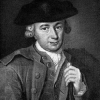Johann Georg Hamann

Johann Georg Hamann
Johann Georg Hamannwas a German philosopher, whose work was used by his student J. G. Herder as a main support of the Sturm und Drang movement, and associated by historian of ideas Isaiah Berlin with the Counter-Enlightenment. However, recent scholarship such as that by theologian Oswald Bayer places Hamann into a more nebulous category of theologian and philologist; he views him as less the proto-Romantic that Herder presented, and more a premodern-postmodern thinker who brought the consequences of Lutheran theology...
NationalityGerman
ProfessionPhilosopher
Date of Birth27 August 1730
CountryGermany
What Tarquin the Proud said in his garden with the poppy blooms was understood by the son but not by the messenger.
What good to me is the festive garment of freedom when I am in a slave's smock at home?
Physics is nothing but the ABC's. Nature is an equation with an unknown, a Hebrew word which is written only with consonants to which reason has to add the dots.
Indeed, if a chief question does remain: how is the power to think possible? - The power to think right and left, before and without, with and above experience? then it does not take a deduction to prove the genealogical priority of language.
If only I was as eloquent as Demosthenes, I would have to do no more than repeat a single word three times.
Everything is vain and tortures the spirit instead of calming and satisfying it.
Every phenomenon of nature was a word, - the sign, symbol and pledge of a new, mysterious, inexpressible but all the more intimate union, participation and community of divine energies and ideas.
All human wisdom works and has worries and grief as reward.
The thirst for vengeance was the beautiful nature which Homer imitated
The weakness of ourselves and of our reason makes us see flaws in beauties by making us consider everything piece by piece.
What for others is style, for me is soul.
A writer who is in a hurry to be understood today or tomorrow runs the danger of being misunderstood the day after tomorrow.
Thus the public use of reason and freedom is nothing but a dessert, a sumptuous dessert.
Lies, fables and romances must needs be probable, but not the truth and foundation of our faith.